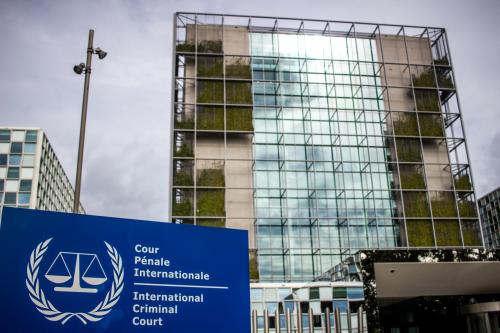Israel’s Knesset passed a bill that strips Israel’s Supreme Court of the power to declare government decisions unreasonable. The so-called “reasonableness bill” passed with a 64 to 0 vote after all members of the Knesset’s governing coalition voted for it and all members of the opposition left the chamber. Passage of the bill has sparked turmoil in the country. Natan Sachs, director of the Center for Middle East Policy at Brookings and a senior fellow in Foreign Policy, discusses what’s happening in Israel.
TRANSCRIPT
[music]
DEWS: You’re listening to The Current, part of the Brookings Podcast Network. I’m Fred Dews, former host of the Brookings Cafeteria podcast, which you can still find on our website at Brookings dot edu slash podcasts. Now I’m joining my colleague Adriana Pita as co-host of The Current, giving you more analysis from Brookings scholars on breaking news and current policy conversations.
On Monday, Israel’s Knesset passed a bill that strips Israel’s Supreme Court of the power to declare government decisions unreasonable. The so-called “reasonableness bill” passed with a 64 to 0 vote after all members of the Knesset’s governing coalition voted for it and all members of the opposition left the chamber. Passage of the bill has sparked turmoil in the country, with demonstrations in Tel Aviv, Air Force reservists saying they will not report for duty, and the country’s doctors saying they will go on strike. To discuss what’s happening in Israel, I’m joined by Natan Sachs, director of the Center for Middle East Policy at Brookings and a senior fellow in Foreign Policy. Natan, welcome to The Current.
SACHS: Thanks so much, Fred. Good to be with you.
DEWS: So, let’s talk about the context first of what’s happened. What is the reasonableness doctrine that the new law has changed?
SACHS: Well, Israel operates with a common law system. It does not have a clearly defined constitution. It chose instead to have a gradual legislation, what’s known as basic laws, which we can think of as articles of the constitution. But they are very easy to change. And like in most common law systems, especially the British one, a lot of the legislative doctrine comes from history of judicial decisions. And the reasonableness doctrine came about there. It boils down to a judicial review of administrative decisions.
So, reasonableness does not apply to laws. The court will not strike down any law, never struck down a law because it deemed it unreasonable. Rather, it would sometimes evaluate decisions by ministers, the government, or officials, which, for example, could have a conflict of interest or might not have even weighed the serious ramifications of a decision and made something whimsical, capricious decisions which in the United States could also be struck down. All of these came under the umbrella of reasonableness in Israel. And especially was expanded in the 1980s and to include a lot more.
So, it is a special kind of thing in Israel. It is not unlike other administrative review processes in other countries, but it had become expansive and many people, including many on the opposition today, were actually open to some reform in it, but certainly not the reform the government has passed.
DEWS: So, you wrote a piece, that’s on our website, in February about Prime Minister Benjamin Netanyahu’s efforts to limit the role of the Supreme Court. And you said, quote, “In Netanyahu’s new Israel, the slimmest of majorities could decide anything. Pure, unbridled majoritarianism.” But in this new law, the prime minister says he’s fulfilling the will of the voters. So, what do you make of that claim?
SACHS: So, two points on this. The first is that this issue of reasonableness is just one element. It’s not a small element, but it’s only one element and small in comparison to the vast project that this government set out to limit the ability of the court to oversee or to override both legislative decisions and executive decisions. The goal of the sweeping program by the government was really to undo the one check on legislative and government decisions in Israel. Reasonableness is really only one relatively small element in that.
Why did I write that? Well, if you think of the United States, for example, if a small majority in the House of Representatives wanted to pass an outrageous law curtailing the rights of some minorities, say after a terrorist attack or something else–it’s happened, of course, in history–but you could easily imagine a case like that. Well, it might pass the House perhaps, but it would still have to pass the Senate. And the Senate has a filibuster. Then it would go for a presidential veto, which is hard to override. It can be done, but it’s very hard to override. Then it would go to a whole set of federal courts and they would operate with a very clear Bill of Rights that’s enshrined in the Constitution as amendments to it that are very, very hard to change.
In Israel,if a small majority, say 61 members of 120–or right now 64 members of 120–members of the Knesset wanted to pass a bill curtailing minority rights or individual rights, there is no second House, there’s no higher chamber, there is no presidential veto. There are no courts except only one. The Supreme Court wearing a hat as High Court of Justice that can strike down legislation by the Knesset.
In other words, there really is only one check on majoritarian rule on what a very small majority could do in any way. In essence, this is, of course, an extreme case. They haven’t proposed this, but they could decide to strip someone of their citizenship or the extreme to execute someone because they’re extremely annoying. Now, this is, of course, facetious, but theoretically speaking, there is only one check on that, the Supreme Court and the full scope of the program by the government would have made that moot and would have allowed a small majority to exercise unbridled majoritarianism, which to my mind is of course a component of democracy, but is absolutely not the same thing as democracy.
DEWS: Well, let me ask you, Natan, to talk about even the wider context in Israeli politics. I know it’s something you’ve talked with Adrianna a lot about on this very show over the last few years, and that’s the the numerous elections that have happened in Israel for prime minister, the very razor thin margins in the Knesset that Prime Minister Benjamin Netanyahu has put together, and also the current composition of this coalition right now, which seems to be maybe the most conservative in a long time. So, the context, the will of the voters is also against that backdrop.
SACHS: Yeah. So, this was coming out of five years of severe political crisis. It started mostly with the indictment of Benjamin Netanyahu, the current prime minister, on three cases of corruption. He’s still on trial. The trial is ongoing right now. So, he’s, of course, innocent until proven guilty. But that set in motion a major crisis whereby Israel saw four elections that essentially ended in a draw with almost no ability to form a coalition government. Israel’s a parliamentary system, and in the parliamentary system with multi parties, they need to form coalitions that will command a majority in the Knesset so as to form a government. There was one case of a grand coalition government, but it fell apart quickly.
And finally, Israel came to elections late last year, where after all these rounds, the coalition led by Benjamin Netanyahu did manage to garner a small but decisive lead with 64 seats. And so Netanyahu came to power. But to do so, he had to orchestrate a coalition and, in fact, pre-election running of the very, very far right. I don’t think conservative is even the right word for it. This includes some elements that the Conservative Party, like the Likud, Netanyahu’s party, used to shun because these were beyond the pale, some of these. They are now senior members of his own coalition. So, this is easily the most extreme coalition in Israel’s history.
And it’s especially true on Israeli policy in the West Bank and with regard to Palestinians, but also on issues of religion and state and many other things. What they agreed upon when they came together was that the first order of business would be a passage of this very sweeping judicial overhaul led by the justice minister from Netanyahu’s Likud Party, Yariv Levin. And that is what they set out to do. They set out such an ambitious and sweeping plan that they made an error of judgment. They managed to galvanize a huge opposition to it by instead of passing small things, like they’re trying to do now, they tried initially to set up a huge agenda, and that really got the opposition and everyone else up in arms.
I’ll just say about the majority will here. The 64 votes, 64 seats in the Knesset do represent a majority of Israelis. I should say in current polling it’s very clear that a majority of Israelis opposes, clearly opposes, passage of this legislation without wide consensus. But, of course, polls are just polls. Elections are the poll that really counts. And they do have a majority.
But what they’re passing here is not simply policy. What they’re passing here is fundamental changes to the constitutional makeup of the country. And so, it is legal in Israel. They can pass this bill and it is now law. But if you think of the equivalent in the United States, it would be as if a small majority, again in the House of Representatives decided to change the Constitution. In America, of course, that would be impossible. It would take both houses, it would take also a majority of the states. It would take a very long time, and today it would basically be impossible.
Secondly, majority rule is an essential part of democracy, but it is not the same thing as democracy. Democracy is rule of the demos, the people. And the people are the majority, they are also the minority. They’re in fact every last individual is a sovereign in a democracy. Now, of course, in democracy we usually give the right of way to the majority. That makes sense. We want to aggregate the preferences of the population and the majority should have right of way. But there have to be limits on that. The majority cannot decide to abuse the minority just because they happen to be a majority one day.
Now, this legislation in and of itself is not necessarily an abuse, although I said it’s a constitutional change, but it would open the door to a government deciding things that if there were no Supreme Court to stop them, there would be simply no check on them. It would be unbridled majoritarianism. And in that sense, it’s a deep infringement on democracy.
DEWS: Well, let’s connect that then to the street protests we’ve seen, some of the other protests around the country. And also, I think it’s worth noting that these didn’t start just on Monday or Tuesday. Right? They’ve been going on for a while. Can you talk about kind of what you’re seeing in the Israeli populace that’s opposed to this, people on the street? I mean, have you seen protests like this before?
SACHS: This is completely unprecedented in the history of Israel. And if you look at the numbers as a proportion of the state, it is absolutely enormous. These are large percentages of the population that are participating actively in the streets. These are not young radicals simply. It is wide swaths of the population, people of all ages and of all professions. You’ve seen industry, academia. Even now, reservists in the military, as you mentioned, saying they will not volunteer to serve. No one’s disobeying an order to show up yet. We haven’t seen that, but we have seen very large numbers of people, and especially pilots in the Air Force say they will not show up for their volunteer duty and that can severely hinder the readiness of the Israeli air Force, which is a very important component of the Israeli Defense Forces.
And these demonstrations really have shown an absolutely remarkable strength by civil society and the opposition very well-organized, extremely energetic, and extremely resilient and persistent. We are going now on week 29, I believe, of every weekend and often during the week at night and in the heat and during work days of massive demonstrations, not only in Tel Aviv but in Jerusalem, my hometown, by the Knesset, in Jerusalem, and all over the country, and all different parts of the country. Truly a remarkable show of force.
In March, after threats by some reservists not to show up for volunteer service, the minister of defense said he might not support this kind of legislation. The prime minister then declared that he would fire the defense minister. He did not actually do it. And then we saw the largest to date, then, eruption of demonstrations all through the night that actually caused Netanyahu, the prime minister, to step back and pause with the legislation, scale it down, and move to negotiation with the opposition, which he said with the aim of reaching some kind of consensus. What we saw this week was a break again from that move and a return to passing legislation bit by bit and certainly sort of a salami tactic as the opposition sees it.
DEWS: Right. I saw that the Prime Minister suggested that he had offered compromise on the bill and that the compromise was rejected. So they went ahead.
SACHS: Netanyahu is portraying this as, of course, the opposition refusing to negotiate. And there is something to the point that the opposition in a vacuum in a different year with a different prime minister, would probably have easily agreed on some form of changing what reasonableness is. But in the context of this prime minister, with his very low credibility in negotiations in the Israeli political system, at least, and especially in the backdrop of the just sweeping revolution in Israeli institutions that the government declared officially, the opposition doesn’t believe a word he says, to be perfectly frank, and are refusing to believe that this alone is the end of the story. They think this is just the first step in what will be a much larger push.
DEWS: So, the Biden administration has criticized this particular action and also other actions taken by the Netanyahu government recently. What are the stakes for the United States in this controversy?
SACHS: Well, the Biden administration finds itself in a bind. On the one hand, Biden himself is very pro-Israel. He’s old school Democratic pro-Israel in that regard, more so than I would say, the median Democrat today. And also the United States really relies on the alliance with Israel for its vision of how it might manage its Middle East policy going forward, which would rely much more on partners in the region, including those with military capacity. And Israel would be first among them.
Nonetheless, this kind of legislation and the way it’s being passed is extremely troubling for Americans, as it should be. Partly because Israel, the United States, their partnership is not just one of interests. It’s also based on this idea at least, that they share deep values. And first among them is democracy. That is, of course, always we should put always parentheses around that–there is the Palestinian question and a very important question of their status. But within Israel, within the Green Line, at least, Israel’s democratic status has always been a cornerstone of the partnership with the United States.
Since that’s been called into question and since the ramifications for Israeli society are so profound, the polarization we’re seeing today in Israel is truly unprecedented between those opposing Netanyahu, but also those who support Netanyahu who feel very embittered by these mass demonstrations and what they feel is an attempt to use force to stop their majority from from enacting its policy.
This kind of polarization, this kind of damage matters a lot to a country that sees Israel as a close partner. And so, we’ve seen Biden make a departure from standard practice, which is usually not to opine about domestic issues in a friendly country. He did so hesitatingly at first, but as much more forcefully recently both himself but also via interviews. And he’s relied mostly on the idea that any such legislation–he doesn’t say so–but legislation that is basically constitutional in nature should pass with consensus. So, rather than opine about this law or that law, he says a majority of a clear majority, a consensus of Israelis, need to support something of this, or I call for it not to happen. He’s pushed for Netanyahu to stop. He probably helped the pause that Netanyahu took in March. It did not help this time, and he went forward with it anyway. And it remains to be seen what it means going forward for future legislation.
DEWS: Well, last question for you, Natan. What are you watching for in terms of what might happen next?
SACHS: I’m watching for two things. The first is what is next in terms of the Netanyahu coalition plan. You could read it in different ways. Netanyahu maybe pausing now and saying, okay, I gave a win for my coalition and my constituency, saying, look, we managed to pass something important despite this very strong opposition and then perhaps turn to other things that would be less damaging to the state. The economy is taking a hit by this. The market is going down. The shekel is losing value. We’ve seen Moody’s and now S&P issue warnings on Israel. There’s a lot of reason for him to pause.
On the other hand, there are many different items that he would like to pass. As I said, he’s also on trial. He may have his own interests involved and especially with judicial appointments. So, the first thing I’ll be looking for in the fall or late fall is whether the government takes up suggestions to change the process of judicial appointments to politicize it. If they managed to politicize the Supreme Court, then they don’t really need to change the separation of powers as much because they could control both.
The second aspect relates to foreign policy. We are seeing in recent months, despite all of this, despite all the skepticism for many different reasons, a concerted effort in Jerusalem, but also in Riyadh and in Washington, to promote Israeli-Saudi normalization. And in fact, Saudi Arabia and Israel have formally been at war. So, it would be peace. This would be a dramatic change in Israeli standing in the region and to a certain degree for the region as a whole. It would be significantly bigger than the Abraham Accords. Saudi Arabia’s much bigger and more important than the UAE or the other partners. And it would also probably entail a significant steps by Israel on the Palestinian front. This would be very important for other regards, but it would also relate to what we’re talking about today, and that is the domestic issues.
That kind of deal would probably be very hard for the right flank of Netanyahu’s coalition to swallow. And we may see Netanyahu try to push for a different coalition in a vacuum. A different coalition is not available. The center simply does not trust Netanyahu anymore. They trusted him once too many two years ago. But in the context of peace with Saudi Arabia, that would give them political cover to do this. And I think if it entailed a real agreement with Saudi Arabia with significant changes to the reality in the West Bank that would offer some hope for betterment in the future, I think you could see a different coalition. Then this legislative effort would necessarily be gutted. It’d be a very risky move for Netanyahu politically and he is not known as a risk taker. So, we should all be very skeptical that this could happen. But nonetheless, it is possible, it is in the cards. And so, that’s a major thing I’m looking for. It’s more foreign policy, but it would relate to domestic issues in Israel as well.
DEWS: Okay. Well, let’s leave it there for now. I want to thank you Natan for taking the time to talk with me today on The Current.
SACHS: Thank you so much, Fred.
[music]
The Brookings Institution is committed to quality, independence, and impact.
We are supported by a diverse array of funders. In line with our values and policies, each Brookings publication represents the sole views of its author(s).






Commentary
PodcastIsrael’s Supreme Court reform crisis
July 28, 2023
Listen on
The Current Podcast